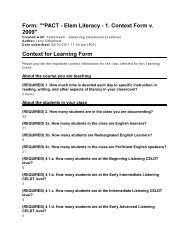The Tutoring Book - California State University, Sacramento
The Tutoring Book - California State University, Sacramento
The Tutoring Book - California State University, Sacramento
You also want an ePaper? Increase the reach of your titles
YUMPU automatically turns print PDFs into web optimized ePapers that Google loves.
Struggling or Stuck? <strong>Tutoring</strong> Graduate Students<br />
50<br />
Melissa Diaz<br />
Fall 2008<br />
I felt confident as I walked to Rina’s table and sat down. I introduced myself and asked<br />
her what we were working on that morning; however, when she pulled out an 80 page thesis, my<br />
confidence went out the window. Her cultural studies topic was something I had no knowledge<br />
of whatsoever. As I read, I thought, “How am I going to help her with this? It looks perfect.” She<br />
reassured me that any suggestions for improvement would be a big help since she couldn’t take it<br />
back to her first thesis reader until more revisions were made, but it was as if all my tutoring<br />
knowledge left me. What could I help her with? Where do I look? I could barely follow her<br />
topic! Inside, I had just about given up.<br />
---------------------------------------------------------------------------------------------------------------------<br />
Although it is rare for students to walk into the Writing Center with a thesis, graduate students regularly<br />
come in with advanced writing assignments. This article is intended to help those of you who might face a<br />
similar situation to mine, and provide some advice on how to handle these types of graduate tutoring<br />
sessions.<br />
To clarify, the graduate students I am referring to are typically native English speakers. While much time<br />
and research has gone into L2 graduate tutoring, few studies have focused on the native speakers who<br />
seek help in the writing center and what to do in those situations (Garbus 1).<br />
Julie Garbus, professor of English and coordinator of the <strong>University</strong> of Northern Colorado’s Writing<br />
Center, states that graduate students’ writing levels are expected to be advanced. When students enter or<br />
return to graduate school they often find themselves struggling with the conventions of their discipline, or<br />
the high expectations of their professors, In her article<br />
“<strong>Tutoring</strong> Graduate Students in the Writing Center,” Garbus explains that, “Whether or not they<br />
are in a field requiring extensive writing, graduate students must take writing seriously, not just<br />
to make themselves understood but because writing in a discipline is intimately linked with<br />
thinking, reasoning, and persuading effectively in it” (1). <strong>The</strong> “serious” nature of the writing at<br />
this level leads graduate students to visit the writing center despite the fact that graduate students<br />
are often embarrassed about needing a tutor and can initially be resistant to tutoring, as John<br />
Farrell points out in his article “Some Challenges to Writing Centers Posed by Graduate<br />
Students” (4).<br />
In “Peer <strong>Tutoring</strong>,” Gregory Waters states, “because students often emerge with a variety of needs, the<br />
system of instruction should be flexible enough to accommodate itself to the needs<br />
of the individuals served. Some students require hours of instruction to improve their scribal<br />
fluency; others are already masters of their personal style” (749). Graduate tutees often fall in the<br />
latter category, having a greater sense of control over, variety, and sophistication in their writing.<br />
Waters’ suggestion that you have to realize that the needs of writers you will work with will vary<br />
holds true: ironically, however, graduate tutees require help on issues such as higher order concerns just<br />
as much as less experienced writers do. Difficulty arises for the tutor because their<br />
issues might not be as apparent as those of less experienced writers, making it challenging to<br />
locate them. <strong>The</strong> results of a nationwide survey performed by Judith Nelson and Jane Powers<br />
revealed that graduate students who are native speakers most often asked for help with organization, style,<br />
and content not like the less experienced writers or L2 writers after all (p #).<br />
Knowing that your advanced writers struggle with similar problems as other writers should aid in<br />
lessening your anxiety about working with them and make handling their papers less<br />
overwhelming.

















